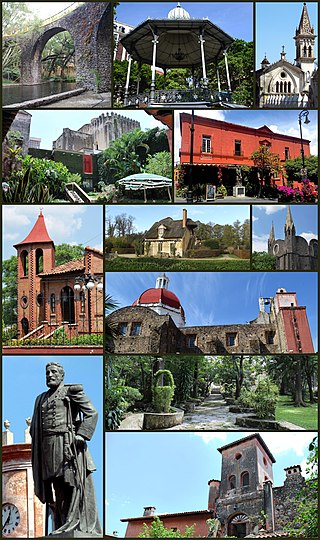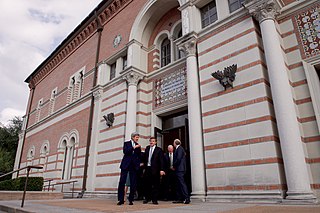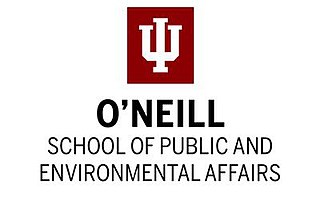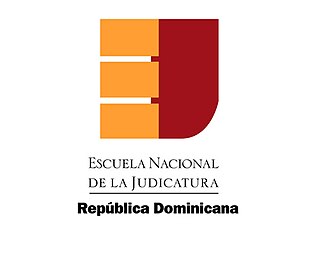
Harvard Law School (HLS) is the law school of Harvard University, a private research university in Cambridge, Massachusetts. Founded in 1817, Harvard Law School is the oldest law school in continuous operation in the United States.

Cuernavaca is the capital and largest city of the state of Morelos in Mexico. Along with Chalcaltzingo, it is likely one of the origins of the Mesoamerican civilization. Olmec works of art, currently displayed in the Museum of Anthropology in Mexico City were found in the Gualupita III archeological site.

Black studies or Africana studies, is an interdisciplinary academic field that primarily focuses on the study of the history, culture, and politics of the peoples of the African diaspora and Africa. The field includes scholars of African-American, Afro-Canadian, Afro-Caribbean, Afro-Latino, Afro-European, Afro-Asian, African Australian, and African literature, history, politics, and religion as well as those from disciplines, such as sociology, anthropology, cultural studies, psychology, education, and many other disciplines within the humanities and social sciences. The field also uses various types of research methods.

"Rice University's Baker Institute for Public Policy", also known as the "Baker Institute", is an American think tank housed on the campus of Rice University in Houston, Texas. Founded in 1993, it functions as a center for public policy research. It is named for James A. Baker, III, former United States Secretary of State, Secretary of the Treasury, and White House Chief of Staff. It is directed by Ambassador David M. Satterfield and funded mainly by donor contributions, endowments, and research grants.
Pietro Ameglio is an Uruguayan-born Mexican civil rights and peace activist known for his advocacy of nonviolence and efforts to promote peace and anti-militarism in Mexico.
Latino studies is an academic discipline which studies the experience of people of Latin American ancestry in the United States. Closely related to other ethnic studies disciplines such as African-American studies, Asian American studies, and Native American studies, Latino studies critically examines the history, culture, politics, issues, sociology, spirituality (Indigenous) and experiences of Latino people. Drawing from numerous disciplines such as sociology, history, literature, political science, religious studies and gender studies, Latino studies scholars consider a variety of perspectives and employ diverse analytical tools in their work.

The University of Brasília is a federal public university in Brasília, the capital of Brazil. It was founded in 1960 and has since consistently been named among the top five Brazilian universities and the top fifteen universities in South America by Times Higher Education (THE).
Education in Colombia includes nursery school, elementary school, high school, technical instruction and university education.

The San Diego State University College of Arts & Letters provides liberal arts education at SDSU. Its programs in the humanities and social sciences are offered through nineteen academic departments and a number of interdisciplinary programs, each of which is designed to help students understand their role in society and to develop aesthetic sensibilities. With 300 permanent faculty and many associated lecturers, this is the largest of the seven colleges, and is responsible for over one-third of the instruction at SDSU. Because the college occupies an important role in general education, virtually all SDSU students take courses offered here.

St. Mary's University School of Law is the law school of St. Mary's University, a private Catholic university located in San Antonio, Texas.

The McCourt School of Public Policy is one of ten constituent schools of Georgetown University in Washington, D.C. The McCourt School offers master's degrees in public policy, international development policy, policy management, data science for public policy, and policy leadership as well as administers several professional certificate programs and houses fifteen affiliated research centers. The McCourt School has twenty-one full-time faculty members, ten visiting faculty members, more than one-hundred adjunct faculty members and approximately 450 enrolled students across the various degree and executive education programs.

The UCLA Luskin School of Public Affairs is the public affairs/public service graduate school at the University of California, Los Angeles. The school consists of three graduate departments—Public Policy, Social Welfare, and Urban Planning—and an undergraduate program in Public Affairs that began accepting students in 2018. In all, the school offers three undergraduate minors, the undergraduate major, three master's degrees, and two doctoral degrees.

The Paul H.O'Neill School of Public and Environmental Affairs is the public policy and environmental studies school of Indiana University with locations on both the Bloomington and Indianapolis campuses. It is the largest and highest-ranked public policy and environmental studies school of its kind in the United States. Founded in 1972, as the Indiana University School of Public and Environmental Affairs, it was the first school to combine public management, policy, and administration with the environmental sciences. O'Neill School Bloomington is the top ranked school of public affairs in the United States. The school received a facelift and expansion when the Paul O'Neill Graduate Center opened for classes in the Spring 2017 semester due to the growing influx of students. In 2019, the name was changed to the O'Neill School of Public and Environmental Affairs in honor of alumnus Paul H. O'Neill who served as the United States Secretary of the Treasury in 2001–2002.

Tulane University Law School is the law school of Tulane University. It is located on Tulane's Uptown campus in New Orleans, Louisiana. Established in 1847, it is the 12th oldest law school in the United States.
New Philology generally refers to a branch of Mexican ethnohistory and philology that uses colonial-era native language texts written by Indians to construct history from the indigenous point of view. The name New Philology was coined by James Lockhart to describe work that he and his doctoral students and scholarly collaborators in history, anthropology, and linguistics had pursued since the mid-1970s. Lockhart published a great many essays elaborating on the concept and content of the New Philology and Matthew Restall published a description of it in the Latin American Research Review.

Sergio Méndez Arceo was a Mexican Roman Catholic bishop, activist and human rights supporter. A product of a wealthy family, Méndez Arceo's father was a successful lawyer and his uncle was a prominent archbishop believed to be involved in the church-state conflict of the 1920s. Méndez Arceo graduated from the Pontifical Gregorian University of Rome and served as a Seminary professor in Mexico. He became Roman Catholic Bishop of Cuernavaca, Morelos, in 1953 and served in that capacity until 1983.
Marvin Alfred Mottet was a 20th and 21st century Roman Catholic priest in the Diocese of Davenport in the US state of Iowa. He was a noted advocate of social justice causes.

The RGK Center for Philanthropy and Community Service is a research center at University of Texas at Austin located in the Lyndon B. Johnson School of Public Affairs. The teaching and research of the RGK Center are focused in the areas of nonprofit organizations, philanthropy, social entrepreneurship, and volunteerism.

The Brown Center for Students of Color (BCSC), formerly known as the Third World Center, is a center for the support of students of color at Brown University. Founded in 1972 at Brown University in Providence, Rhode Island, the Center is "a place and space for students of color to explore their identity, develop their leadership skills, and build a sense of community in a welcoming and supportive environment." The BCSC was founded out of a rich history of student activism and organizing, a history that is honored in its mission today.

The National Judicial College(ENJ in Spanish) is the body that is responsible for training and ongoing formation of all servers in the Dominican Judiciary. As an educational institution is recognized by the National Council of Higher Education as a Specialized Institute of Higher Studies.















